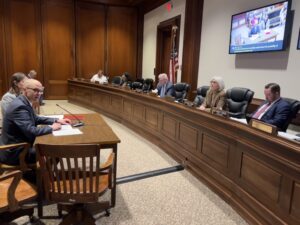Who is a member?
Our members are the local governments of Massachusetts and their elected and appointed leadership.

MMA Executive Director Adam Chapdelaine testifies in support of the Municipal Empowerment Act’s local-option revenue provisions at a Feb. 29 hearing of the Joint Committee on Revenue.
The MMA and municipal officials testified before the Joint Committee on Revenue on Feb. 29 in support of the fiscal components of Gov. Maura Healey’s proposed Municipal Empowerment Act.
The municipal panel focused on the importance of the local-option revenue-generating provisions in the governor’s bill (S. 2571), as well as several municipal finance efficiencies and flexibilities.
The MMA asked the committee to support the governor’s proposal to allow municipalities, with local legislative approval, to add .25% to the local meals tax, creating a maximum local tax of 1%. Since 2009, when the Legislature authorized a local-option meals tax, 251 municipalities have adopted the measure at a rate of .75%. The change would add just 25 cents to a $100 restaurant tab, which, the municipal panel argued, is hardly enough to dissuade patrons.
The panel noted that the meals tax proposal is smaller than the still-modest proposal in a Senate bill (S. 1800), supported by the MMA, that would increase the local meals tax by .75%, raising the ceiling to 1.5%. Even with a higher increase, Massachusetts would remain very competitive in its overall meals tax rate, compared to the rest of New England and New York. The governor’s proposal would bring the combined state and local meals tax rate to just 7.25%, still the lowest in the region.
Local officials also asked legislators to support a 1 percentage point increase in the local-option lodging tax, from 6% to 7% (6.5% to 7.5% in Boston). They noted that the small increase could generate $49 million annually statewide to support local government services, and the rate has not increased since 2009. Critical infrastructure services that cities and towns provide and maintain, and that help motels and hotels thrive, come with hefty price tags, and funds generated from a lodging tax increase would help meet those needs.
The municipal panel also asked legislators to support a proposal to allow municipalities, at local option, to adopt a new 5% surcharge on the motor vehicle excise tax. The provision would be particularly helpful to municipalities that don’t benefit from local meals and lodging tax options, such as many smaller or rural communities. The motor vehicle excise tax option would be available to all 351 cities and towns.
The average motor vehicle excise tax bill is $154, so a 5% surcharge would cost the vehicle owner just $7.70 more per year. The modest increase could generate close to $50 million for cities and towns in all corners of the Commonwealth.
Finally, local officials expressed support for increased flexibility for municipal governments to make decisions concerning specific property tax exemptions, such as a means-tested senior property tax exemption.
In addition to remarks at the hearing, the MMA provided comprehensive written testimony.
On Feb. 27, the MMA and local officials testified in support of the Municipal Empowerment Act before the Joint Committee on Municipalities and Regional Government, which focused on provisions related to the remote and hybrid public meeting option, doubled-up utility poles, and other municipal operations. (View the MMA’s written testimony to this committee.)
The Municipal Empowerment Act currently remains with the Joint Committee on Revenue and the Joint Committee on Municipalities and Regional Government.